10 types of income on which you don’t have to pay taxes in the United States
People who earn some kind of compensation in the U.S. are usually required to pay taxes. However, there are certain types of income that are not taxable.

Taxpayers in the United States must file their returns each year, as well as make the necessary tax payments corresponding to their income.
The IRS sets tax rates, or the percentages of taxes paid based on the filer’s taxable income. Taxable income is defined as any revenue that is subject to federal taxes, whether earned or not.
However, not all income qualifies as taxable. There are some types of money received on which taxes do not have to be paid.
10 types of income on which you don’t have to pay taxes in the United States
People with income below the standard deduction are not required to file taxes. Aside from this, here are 10 types of income for which you do not have to pay taxes either:
Veterans benefits
Benefits paid to veterans and their families are not subject to taxes. These include, among others, education, training and subsistence allowances, disability compensation, housing and vehicle subsidies.
Child support payments
Any money you receive as child support is not taxable.
Social assistance programs
Welfare payments, such as those provided by the Supplemental Nutrition Assistance Program (SNAP) or Temporary Assistance for Needy Families (TANF) program, are not subject to tax by the IRS.
READ ALSO: The share of US national wealth held by the top one percent of households surpasses thirty percent
One year ago today, we launched Metro Lift, a program that offers 50% off Metrobus & Metrorail trips for customers who receive SNAP benefits. We’ve provided 560K trips since the program launched! Learn more: https://t.co/9nNvUrsFS0 #wmata pic.twitter.com/W5Kt0GzeBG
— Metro Forward (@wmata) June 21, 2024
Workers' compensation
If you receive workers’ compensation for an employment-related illness or injury, this income is tax-exempt as long as payments are made under the workers’ compensation law.
Foster care payments
If you are a foster parent who receives foster care payments from a child-placing agency or state or local government, this income is not subject to tax.
Disaster relief grants
Under the Emergency Assistance and Disaster Relief Act, if you receive relief grant payments after a disaster and use the proceeds to cover necessary expenses, such as medical, dental, housing, personal property, transportation or funeral expenses, this income is exempt from taxes.
Supplemental Security Income (SSI)
This government program, which provides monthly benefits to low-income people over the age of 65, blind or disabled, is not subject to taxes.
READ ALSO: Over half of Social Security beneficiaries face tax burden
"And so you have welfare programs and SSI programs like that that are heavily reviewed," Susan W. Lanham of @marshallu explains. "There's a lot of oversight associated with those programs that we don't have with EITC."
— Tax Notes (@TaxNotes) June 16, 2024
Check out the full discussion: https://t.co/bnIRhDuXbO pic.twitter.com/TJipiaXVWN
Credit card rewards
Most rewards earned on credit cards, including cash back, miles and points, are not considered taxable income.
Academic scholarships
Related stories
As long as these are used to cover tuition, registration fees, or course-related expenses at an eligible institution, they are not considered taxable income.
Inheritance
There is no federal inheritance tax, so this does not have to paid at the federal level. However, if you were left with an income-producing asset, such as a stock that pays dividends, you may owe taxes on the money you earn from it. Also, as of 2023, six states impose an inheritance tax: Iowa, Kentucky, Maryland, Nebraska, New Jersey, and Pennsylvania.


Complete your personal details to comment